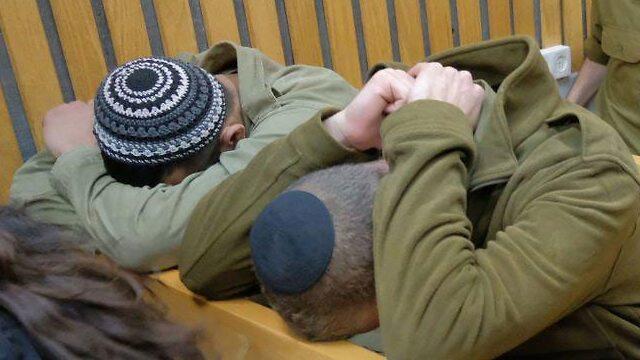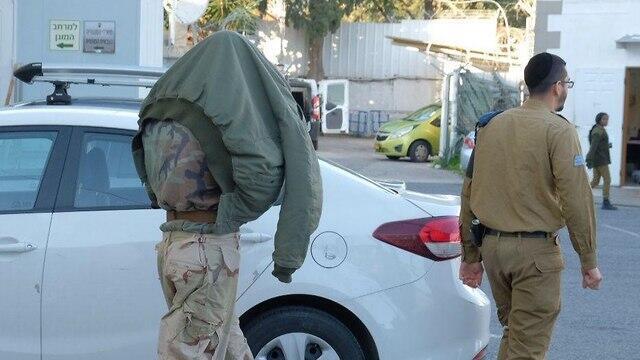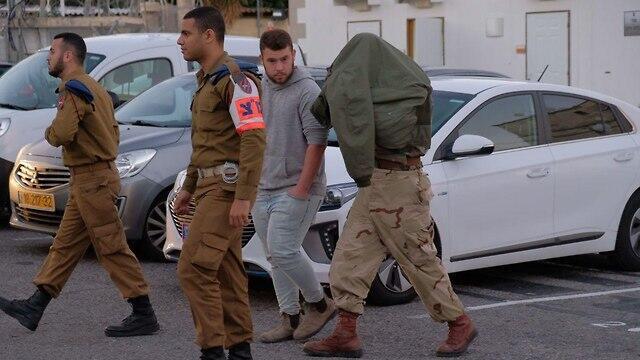Getting your Trinity Audio player ready...
The Israeli military is seeking to reach a plea deal with the five soldiers from the IDF's religious battalion Netzah Yehuda, indicted last week for severely beating two Palestinian detainees ,out of fear that a trial in a military court ahead of the April elections will become politicized affecting the court's proceedings. IDF also fears that a trial will negatively impact the soldiers and their families, as well as other conscripts from the national-religious and national-ultra-Orthodox communities.
and Twitter
The incident took place earlier this month during a manhunt for As'am Barghouti, who shot dead two soldiers from the Netzah Yehuda Battalion at the Giv'at Asaf outpost in the West Bank in December. The two Palestinians were arrested on suspicion they helped Barghouti and his brother—who were also involved in a terror attack near Ofra Junction that left seven people wounded—evade capture. The two detainees were severely beaten while being transported by the Netzah Yehuda troops, leaving them with fractured ribs and noses.
The IDF in general and the Military Advocate General's Office in particular, believe lessons have to be learned from the highly publicized trial of Sgt. Elor Azaria that sparked a public and political outcry after he had been tried in a military court for shooting an unarmed Palestinian terrorist who had already been neutralized.
The fact that the trial is due to take place in the midst of election campaigns c ould politicize this issue to the point that the IDF loses control of the situation. For instance, during the Azaria trial—that was held nowhere near an election campaign—the influx of right-wing politicians that visited the court was enormous.
The fact that the five soldiers are represented this time by military defense attorneys is supposed to assist in the task of reaching a plea agreement, which will most likely include months-long prison sentence. In the meantime, the army's pressure to avoid a trial is supposed to make it easier for the accused to negotiate during the three mediation talks—the first out of which is due to be held next week with another two a week later.
A three-judge panel has already been set up for the trial, headed by the president of Jaffa Military Court, Lt. Col. Carmel Wahabi, who was on the judges’ panel that unanimously convicted Azaria of manslaughter.
One of the officers in the troubled battalion testified to the Military Police Criminal Investigation Division, saying that he didn’t prepare the soldiers for the mental difficulties of transporting those involved in their killing their comrades-in-arms. “We deserved to participate in the arrest operation of those involved in the terrorist attack in which the two Netzah Yehuda soldiers were killed. It was a way to get closure, not a way to get revenge,” said the officer.
"If we knew that the murderer As'am Barghouti was going to be arrested that night, we would have mentally prepared and things would have looked different,” added the officer. “The arrested soldiers are really good and valuable fighters. They are not aggressive. What happened to them does not show their true character because they found themselves in an emotionally stressful situation following the death of their comrades."
Another officer in the battalion emphasized that the indicted soldiers saw the bodies of their comrades after the shooting and did not receive the needed psychological treatment afterwards. "This is an influential factor; the battalion experienced trauma of war. This issue should be approached in a sensitive manner,” he said.
“The five soldiers were charged with aggravated abuse and aggravated battery. The soldiers allegedly cursed, slapped, punched and hit the suspects with fists and blunt objects, targeting their heads as well as other body parts, while the two Palestinians were tied up and blindfolded. The soldiers also allegedly kicked the suspects in the groin and pulled their hair,” said the IDF Spokesperson’s Unit in a statement.
"This indictment should not have been filed to begin with, and we are confident that by the end of the trial all the details will be clarified and things will look differently," said the military defense attorney representing the soldiers.
“These are outstanding soldiers, whose comrades were killed just a month prior, forced into a situation in which they had to carry out the arrests of those who murdered their comrades (sic) … the aspects related to their mental health should be taken into consideration.”




